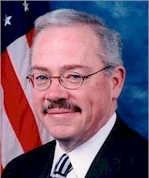
Goss
EPIC Sues NSA for Signals Intelligence Documents
(December 6, 1999) The Electronic Privacy Information Center filed a lawsuit in U.S. District Court in Washington DC on December 3 against the National Security Agency to compel it to comply with a Freedom of Information Act request for documents pertaining to the legality of its signals intelligence activities. The NSA's refusal to provide these same documents to the House Intelligence Committee prompted Chairman Porter Goss to issue a scathing denunciation last May.
| Related Pages |
| Tech Law Journal Summary of EPIC v. NSA. |
| Complaint for Injunctive Relief, 12/3/99. |
| Statement by Rep. Porter Goss, 5/7/99. |
The Electronic Privacy Information Center (EPIC) is a Washington DC based group that was established in 1994 to focus public attention and advocate on emerging civil liberties issues involving telecommunications, computers, and the Internet.
It submitted a Freedom of Information Act (FOIA) request to the National Security Agency (NSA) on June 8, 1999 that requested "copies of all agency records that were located by the agency in response to a request from the House Permanent Select Committee on Intelligence, as described by Committee Chairman Porter J. Goss in . . . House Report 106-130."
The House Intelligence Committee, which oversees and authorizes the NSA, issued House Report 106-130 on the Intelligence Authorization Act for Fiscal Year 2000 on May 7, 1999.
Rep. Goss wrote a Statement which was attached to the Report. He said that "the committee asked the NSA General Counsel to provide the committee with legal memoranda, opinions rendered, and other documents in the General Counsel's Office that established that the advice it was providing to the NSA's technicians, operators, and management was effective in helping the NSA achieve its mission goals and objectives."
He also explained the reason for the request. "If the NSA General Counsel provided too narrow an interpretation of the agency's authorities, it could hamper the collection of significant national security and intelligence information. If, on the other hand, in its effort to provide timely intelligence to the nation's policy makers, the NSA General Counsel construed the Agency's authorities too permissively, then the privacy interests of the citizens of the United States could be at risk."
The NSA refused to provide the documents. Rep. Goss responded that "perhaps for the first time in the committee's history, an Intelligence Community element of the United States Government asserted a claim of attorney-client privilege as a basis for withholding documents from the committee's review."
"These claims are unpersuasive and dubious." said Rep. Goss.
According to Rep. Goss, the attorney client privilege is a judicial rule which is not binding on the Congress. "The Constitution provides that 'Each House may determine the Rules of its Proceedings.' U.S. Const., art. I, Sec. 5, cl.2. Each chamber delegates the authority to rule on objections to the production of documents, such as claims of attorney-client privilege, to its various committees. The rules of judicial procedure are not applicable to congressional inquiries."
EPIC Director Marc Rotenberg said in a December 3 press release that "the charter of the National Security Agency does not authorize domestic intelligence gathering. Yet we have reason to believe that the NSA is engaged in the indiscriminate acquisition and interception of domestic communications taking place over the Internet."
The EPIC FOIA request is not broad. It does not request documents pertaining to the NSA signals intelligence operations. Rather, it only requests documents that were requested by, and refused to, the House Intelligence Committee earlier this year.
 |
|
| Rep. Porter Goss |
Rep. Goss is one of the intelligence community's strongest supporters in the Congress. He is a former CIA officer. He supports massive increases in CIA funding. And, he is an opponent of HR 850, the Security and Freedom through Encryption (SAFE) Act. CIA and NSA representatives have repeated testified and lobbied against this bill.
Moreover, Rep. Goss is hardly an ACLU type liberal. The ACLU publishes a rating of all Members of Congress. In the last Congress (the 105th), Rep. Goss voted the ACLU line only 19% of the time. See, ACLU rating of Rep. Goss.
While the Congress might easily compel the NSA to comply with its request, EPIC now faces an uphill legal battle. The FOIA is one of the most violated, least enforced, and easily evaded statutes in the U.S. Code. While some federal judges in other circuits will enforce the FOIA, the federal judges in Washington DC are among the least likely to compel an unwilling agency to allow access to its records.
By restricting the scope of its request to documents already requested by the House Intelligence Committee, EPIC deprives the NSA of the excuses that the documents either do not exist, or that it needs more time to locate them. However, EPIC still faces the very formidable defenses that the documents are exempted from disclosure under the attorney client privilege or the national security exemption.
The EPIC complaint names as defendants both the National Security Agency (NSA) and the Department of Defense (DOD). The NSA is a separately organized agency within the DOD.
 |
|
| Rep. Bob Barr |
Information about NSA signals intelligence operations may also be revealed as a result of Congressional hearings. Rep. Bob Barr (R-GA) has called for hearings on the subject.
Rep. Barr gave a speech on April 7, 1999, in which he stated:
"I have also today asked for hearings to be conducted in this session of Congress, not simply on the Project Echelon, but on what it represents, in all of its parameters, not just the security or lack of security, with regard to international communications, but domestic communications, the privacy of domestic communications, Internet communications, telephone communication, wire transfers, and so forth, ..."
| Related Story: Rep. Barr Encourages Privacy Advocates to Deluge Congress, 4/6/99. |